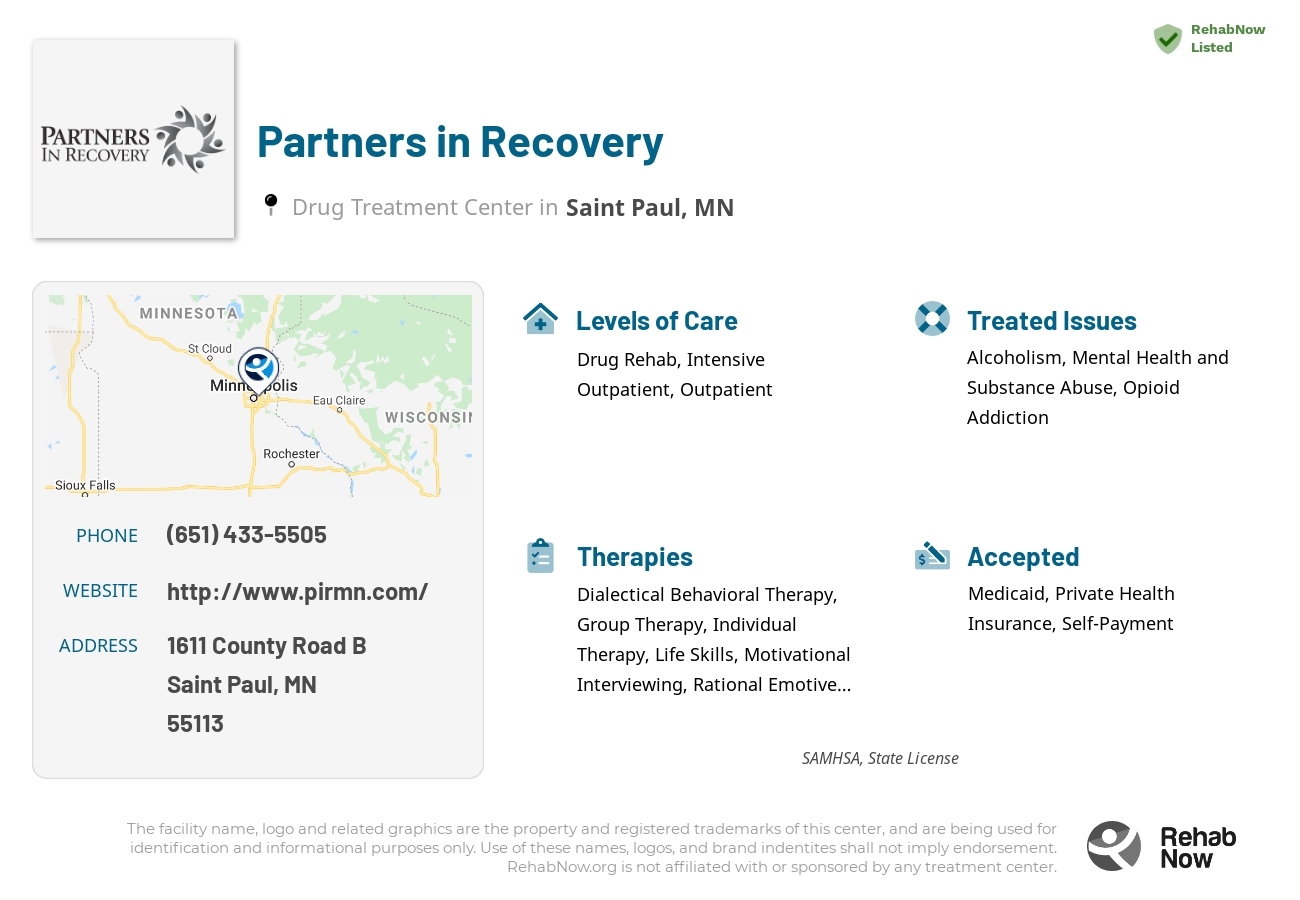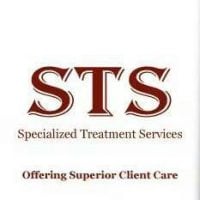Partners in Recovery
Drug Rehab Center in Saint Paul, Minnesota
Partners in Recovery is an addiction treatment center in Saint Paul, MN, providing evidence-based and personalized care, a full range of treatment options, and 24-hour crisis, detox, and aftercare services in a safe and compassionate environment.
About Partners in Recovery in Minnesota
Partners in Recovery is an addiction treatment center located in Saint Paul, Minnesota. They provide a full continuum of care to help those struggling with addiction and substance abuse. Their treatment philosophy is based on the principles of evidence-based practice and trauma-informed care, which emphasizes the importance of meeting the individual's needs through personalized care and support.
Partners in Recovery offers a wide range of treatment options, including medication-assisted treatment, intensive outpatient treatment, outpatient counseling, and peer support. They also provide 24-hour crisis stabilization, detox, and aftercare services for those transitioning to a sober lifestyle. All of these services are delivered in a compassionate, safe environment that allows the individual to recover at their own pace.
Partners in Recovery is accredited by the Commission on Accreditation of Rehabilitation Facilities (CARF) and licensed by the Minnesota Department of Human Services. They also have received numerous awards from the National Institute on Drug Abuse (NIDA) and other organizations. They take pride in their commitment to excellence and strive to provide the best possible care for all individuals seeking addiction treatment.
Genders
Ages
Modality
Additional
Accreditations
State License
SAMHSA
Conditions and Issues Treated
Opioid addiction is when someone becomes addicted to opioids. This can happen quickly due to any opioid use. Opioid withdrawal can be uncomfortable and lead the user to continue using even if they want to quit. It’s best to receive inpatient treatment for detoxification.
Even if a person doesn’t need inpatient treatment, it’s recommended to start rehabilitation or at least some kind of outpatient treatment. This is because the withdrawal symptoms from opioids can be uncomfortable and unpleasant, to the point that a person could end up using again or worse.
Detoxification should be done to break the physical addiction of opioids. This can be done with opioid replacement therapy, medication-assisted therapy, or a more traditional detoxification program. Intensive outpatient treatment is a form of addiction care that allows patients to continue living at home while undergoing treatment. This type of care is appropriate for patients who have been treated in residential treatment programs. Intensive outpatient programs include regular visits to the facility providing therapy, and patients gradually return to their routine life. IOP benefits most when patients have a supportive family member or friend to help them recover.
The first step to getting into an intensive outpatient program is to attend a detoxification facility. Detoxification facilities are designed to remove substances from the body safely. The patient will attend sessions designed to help them understand their addiction and its impact on their lives. While in an intensive outpatient program, therapy sessions are scheduled three to five times per week, with the patient attending no more than two sessions in one day.
Levels of Care Offered
This center offers a variety of custom treatment tailored to individual recovery. Currently available are Drug Rehab, Intensive Outpatient, Outpatient, with additional therapies available as listed below.
An intensive outpatient treatment program, or IOP, is set up for those struggling with an addiction to begin the recovery process. However, the patient will not live at the facility during treatment.
IOP involves patients coming in and out of a medical office building regularly to receive therapy and other services while continuing their life outside of these visits.
IOP is a step up from drug detoxification or alcohol detox. However, it’s still considered a phase of recovery rather than the ultimate goal. There are many rehabs and treatment facilities available to patients in need of IOP.
Outpatient treatment consists of counseling and therapy sessions. The outpatient treatment process begins with the addict’s initial detox period, lasting about ten days. Outpatient treatment is used for those who are at moderate risk for “slipping back” into the addiction. It is also used for those who are not currently experiencing any side effects from withdrawal, can handle social pressure, have a stable living environment, and have a good support system.
Therapies & Programs
Individual Therapy is a crucial component of addiction recovery. Therapists work with patients to identify the root of their addiction and figure out how to better handle the issues that led to them using drugs. Individual Therapy is one on one sessions where people meet with their therapist. Individual therapy provides a safe space for people to open up and discuss personal and sensitive topics which they may not feel comfortable discussing in a group setting.
In this type of therapy, therapists can develop specific solutions for each patient, which helps speed up their recovery process. In addiction recovery, therapy is a crucial part. It allows patients to go deep into their core issues and discover how those problems can be better handled now. Therapy can be performed in individual sessions as well as group settings. In individual therapy for addiction, the patient meets with the therapist one-on-one to focus on the underlying issues of addiction and come up with solutions to prevent future abuse.
Group Therapy is employed by drug treatment centers like Partners in Recovery to provide the recovering addict with a platform to talk about their feelings and experiences. It also provides for an opportunity to learn from other addicts who have successfully overcome their addiction. It is recommended that all group members be recovering addicts for this type of therapy to work.
This type of therapy involves the use of a variety of therapeutic techniques to help addicts recover from past traumas that might have triggered their substance abuse. During these sessions, therapists will work with the addict to address painful memories and learn how to cope effectively with stressors as they arise.
During these types of sessions, therapists will typically focus on three main goals:
- Identifying and expressing painful emotions associated with past traumas.
- Reducing the effects of stress on an addict’s life by developing more effective coping mechanisms.
- Developing healthy ways of thinking about stressful situations that can help addicts avoid substance abuse issues in the future.
This type of therapy is typically used in conjunction with other types of addiction treatment services. By identifying and dealing with the root cause of addiction, most addicts can overcome their cravings and prevent relapse once they leave rehab.
Many different types of addiction treatment services exist to help addicts safely get sober, but it’s important for recovering individuals to find a therapist or support group that will help them address the root cause of their addiction.
Dialectical behavior therapy (DBT) is a type of cognitive behavioral therapy that is focused on helping those with problematic behaviors caused by intense emotions and thoughts control and regulate their emotions and behavior.
Dialectic Behavior Therapy is beneficial for:
- People who have chronic suicidal thoughts and behaviors
- People who have chronic drug cravings
- People who have difficulty establishing and maintaining personal relationships
- People who have a mental disorder such as Borderline Personality Disorder
- People who have experienced trauma in their life
Cognitive Behavioral Therapy (CBT) is an approach and method in psychotherapy. Partners in Recovery asks people to investigate how their thoughts, including habitual, harmful, and inaccurate ways of thinking, affect behaviors. CBT is based on the idea that rigid, inflexible ways of thinking cause people to have a limited ability to cope with stress, which leads to emotional distress.
Likewise, CBT helps people identify maladaptive behaviors and replace them with more positive behaviors. It makes you look at the way you perceive something and ask: Is this a realistic belief? CBT asks people to look at the role of behaviors and emotional responses and how they may be distressing in one’s life. The goal of CBT is to change the way people think and behave to achieve a more balanced, healthier lifestyle.
Moreover, CBT has been shown to reduce some types of anxiety disorders, depression, and symptoms related to thoughts or actions that are considered harmful.
Rational Emotional Behavior Therapy (REBT) offers benefits to addicts in a wide range of situations. This type of therapy helps individuals better understand their emotions and how to manage them in a healthy way.
Individuals who have used addiction treatment services have found this type of therapy beneficial in the following ways:
- Helps individuals identify, understand and manage their emotions in a healthier way
- Assists addicts in developing coping skills to help avoid relapse
- Encourages increased tolerance and less judgmental thinking
- REBT combines cognitive and emotive techniques to help individuals overcome harmful, self-defeating behaviors.
Life Skills Services provide services aimed at helping people enter into and maintain long-term sobriety. The services are offered at varying levels of intensity, specific to the needs and requirements of each patient. Some benefits of these services are restoring hope and empowerment, enhancing family involvement, increasing patient compliance, and reducing relapse rates.
Training someone on improved life skills allows someone recovering from an addiction to feel more capable of taking care of him or herself. The skills taught in Partners in Recovery are daily skills that give a better recovery foundation by simply giving the person tools they need to survive.
Payment Options Accepted
For specific insurance or payment methods please contact us.
Is your insurance accepted?
Ask an expert, call (888) 674-0062
Additional Details
Specifics, location, and helpful extra information.
Saint Paul, Minnesota 55113 Phone Number(651) 433-5505 Meta DetailsUpdated November 25, 2023
Staff Verified
Partners in Recovery Patient Reviews
There are no reviews yet. Be the first one to write one.
Saint Paul, Minnesota Addiction Information
Minnesota is fighting an opioid epidemic that is leaving hundreds of its residents dead each year. Both prescription opioids and illicit opioids are widely abused in the Land of 10,000 Lakes. Heroin continues to be one of the most commonly abused drugs in the state, if not the most common illicit drug. Over 10% of all treatment admissions in Minnesota list heroin as their drug of choice.
Methamphetamine use has led to increased crime in Saint Paul, MN. There were 1,497 drug-related crimes in Saint Paul in 2017. This number represents a 9% increase from the previous year. The community has been hit hard by the opioid epidemic as well. The greatest way to locate the finest rehabilitation facility in Saint Paul, Minnesota, is to inquire about it by talking with your friends, family, and coworkers.
Treatment in Nearby Cities
- International Falls, MN (248.9 mi.)
- Olivia, MN (91.0 mi.)
- Bagley, MN (204.0 mi.)
- Wadena, MN (137.4 mi.)
- Dilworth, MN (213.3 mi.)
Centers near Partners in Recovery
The facility name, logo and brand are the property and registered trademarks of Partners in Recovery, and are being used for identification and informational purposes only. Use of these names, logos and brands shall not imply endorsement. RehabNow.org is not affiliated with or sponsored by Partners in Recovery.













